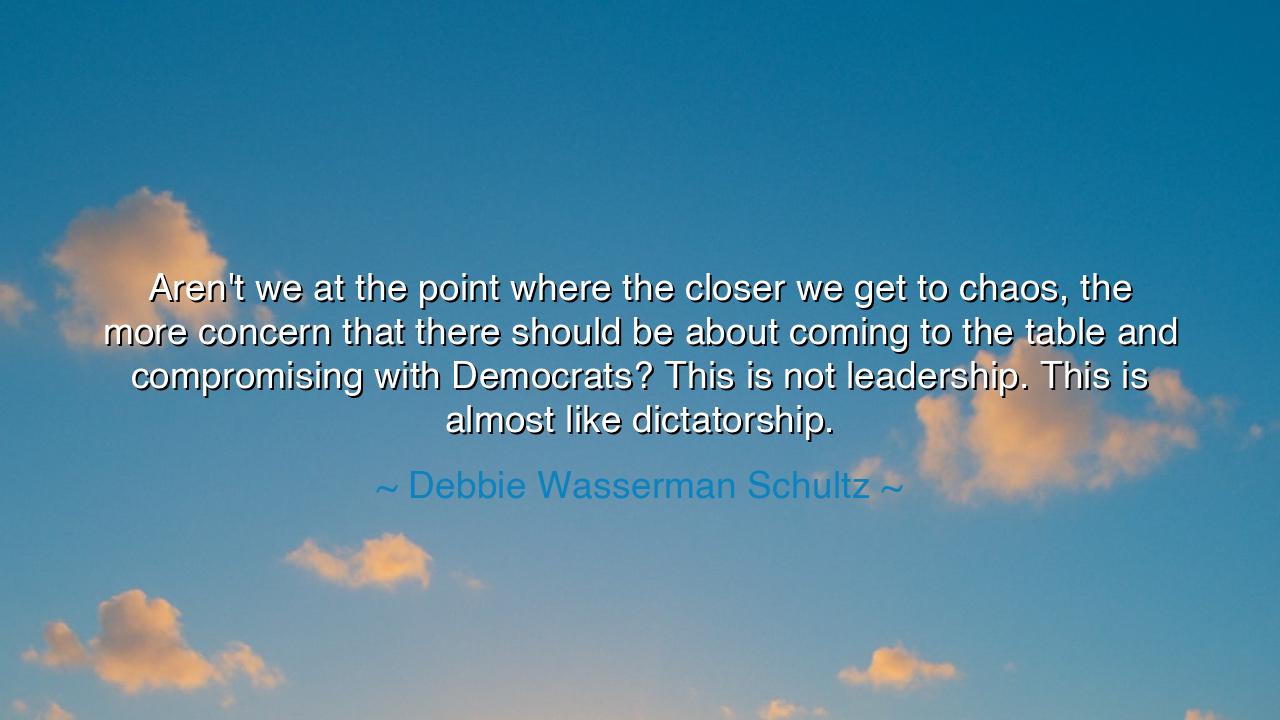
Aren't we at the point where the closer we get to chaos, the more
Aren't we at the point where the closer we get to chaos, the more concern that there should be about coming to the table and compromising with Democrats? This is not leadership. This is almost like dictatorship.






Hear the words of Debbie Wasserman Schultz, spoken in the heat of political struggle, words that echo like the stern warnings of prophets: “Aren’t we at the point where the closer we get to chaos, the more concern that there should be about coming to the table and compromising with Democrats? This is not leadership. This is almost like dictatorship.” In this cry, she lays bare the tension between two paths: the path of cooperation that sustains a republic, and the path of obstinacy that leads to ruin. Her words remind us that when leaders cling to pride and refuse to yield, they bring not stability but turmoil.
The ancients knew well the danger of chaos. In Greece, the polis thrived only when factions met in the agora, giving ear to each other’s voices, even when those voices clashed. When the Athenians refused compromise and silenced dissent, their city tore itself apart in civil strife. In Rome, too, when senators would not seek middle ground but sought instead to destroy their opponents, the republic crumbled into the grip of emperors. Schultz’s warning stands upon this same ancient truth: when compromise is despised, liberty is imperiled.
Her words are not only a critique of one moment in American politics but a timeless reflection on the essence of leadership. True leadership is not the flexing of will, nor the silencing of rivals, but the patient labor of binding diverse people into a greater whole. The leader who scorns the table of negotiation may appear strong, but his strength is hollow, for it rests only on division. Like a house with rotten beams, it cannot endure the storm. Schultz reminds us that to refuse to meet others in honest compromise is not leadership at all, but the shadow of dictatorship.
History gives us many examples of this danger. Consider the fate of Charles I of England, who refused to yield to Parliament, believing his will divine and unchallengeable. His obstinacy brought civil war, bloodshed, and his own beheading. Contrast this with Abraham Lincoln, who, though resolute, knew the power of compromise in preserving the Union—tempering firmness with flexibility, listening even to critics, and seeking to heal as well as to command. One brought chaos, the other enduring order. Schultz’s cry is in this tradition, pleading that leaders choose the harder path of dialogue over the easier path of tyranny.
Yet her words also stir the heart with urgency: “Aren’t we at the point…?” This is the language of warning, the sound of a bell tolling before disaster. She speaks to the moment when division is so sharp, when anger is so fierce, that one more refusal to compromise may plunge the nation into disorder. In such a moment, the people must be awake, must demand that their leaders come to the table, lest the republic drift into darkness. For when leaders exalt pride above service, the people themselves must become guardians of balance.
The lesson for us is plain: do not mistake stubbornness for strength, nor domination for leadership. Leadership demands humility, the willingness to listen, the courage to bend when bending serves the greater good. It is far easier to demonize an opponent than to sit with them, to shout than to listen, to impose than to persuade. But the easier road is the path of decay, while the harder road is the path of endurance.
And so, O listener, let Schultz’s words be a warning to your own life. When conflict arises—in family, in work, in community—ask yourself: “Am I choosing the path of compromise, or am I clinging to pride?” Do not wait for chaos to force humility upon you. Seek the table early. Practice the art of dialogue. Resist the temptation of domination. For if we cannot compromise with those nearest us, how can nations hope to avoid the shadow of dictatorship?
Thus, her words endure as both rebuke and guidance: compromise is not weakness, it is the lifeblood of freedom. Leadership is not domination, it is service. And the refusal to share power is not strength, it is the seed of chaos. Let every generation remember this, and let every citizen practice it, lest the republic be lost to pride.






AAdministratorAdministrator
Welcome, honored guests. Please leave a comment, we will respond soon